Unit 5 Lesson 1 My neighbourhood 课件(共28张PPT,内嵌音视频) 2024-2025学年英语冀教版七年级下册
文档属性
| 名称 | Unit 5 Lesson 1 My neighbourhood 课件(共28张PPT,内嵌音视频) 2024-2025学年英语冀教版七年级下册 | 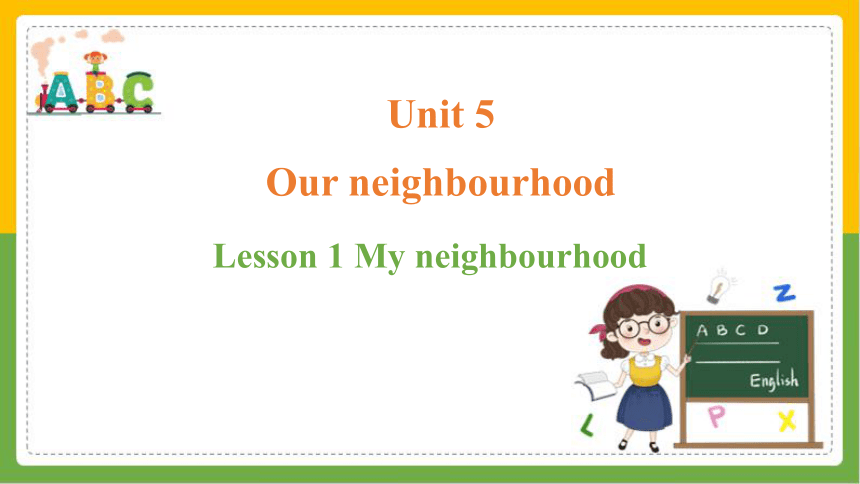 | |
| 格式 | pptx | ||
| 文件大小 | 15.3MB | ||
| 资源类型 | 教案 | ||
| 版本资源 | 冀教版 | ||
| 科目 | 英语 | ||
| 更新时间 | 2025-03-26 11:02:04 | ||
图片预览

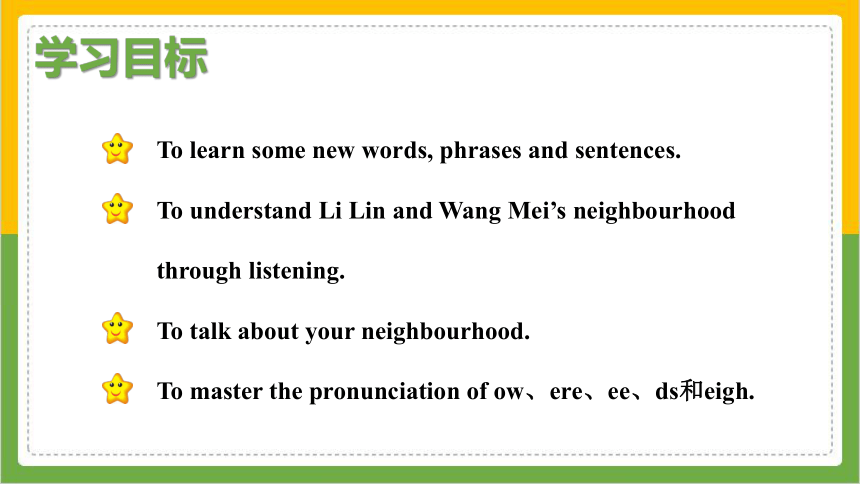
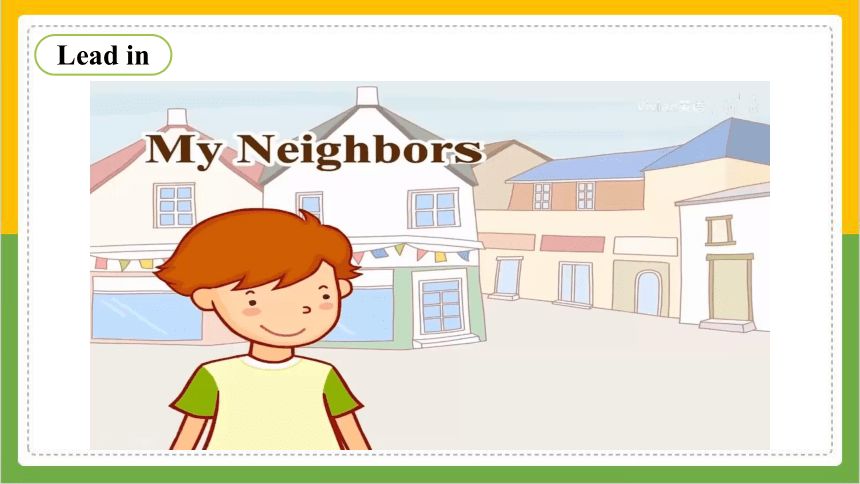
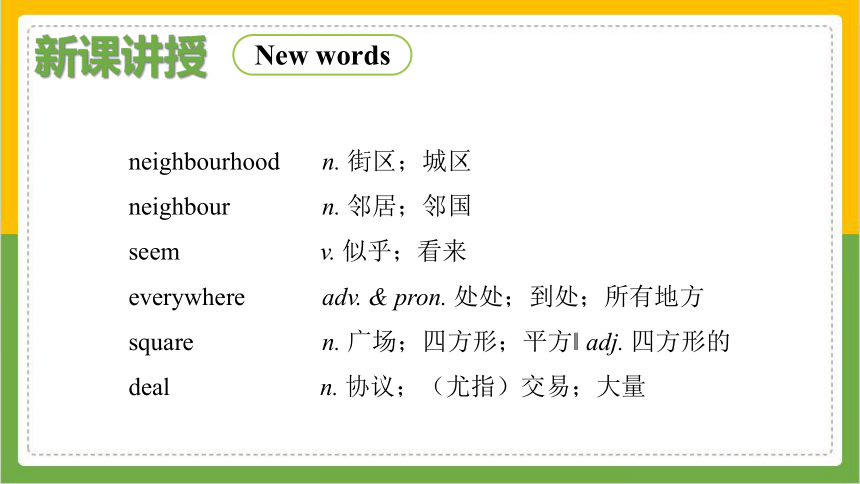
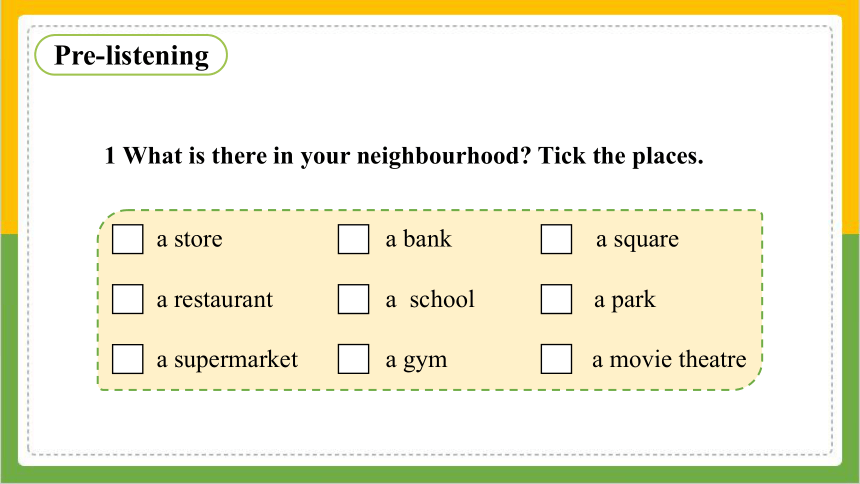
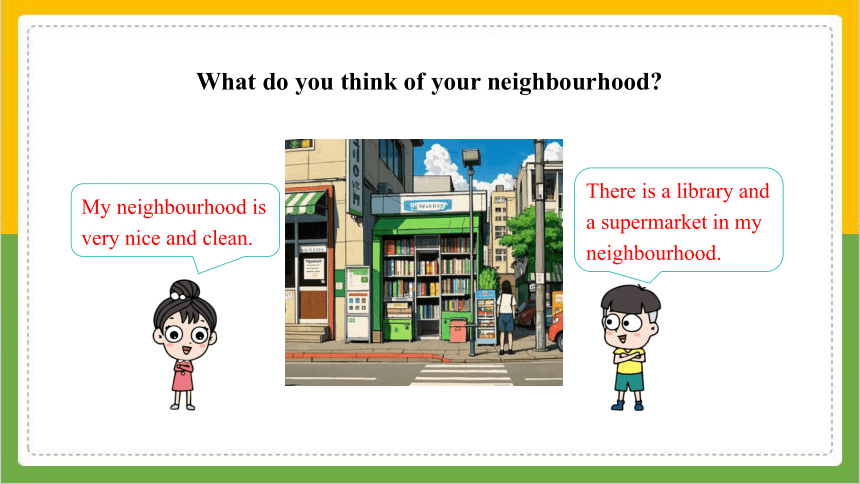
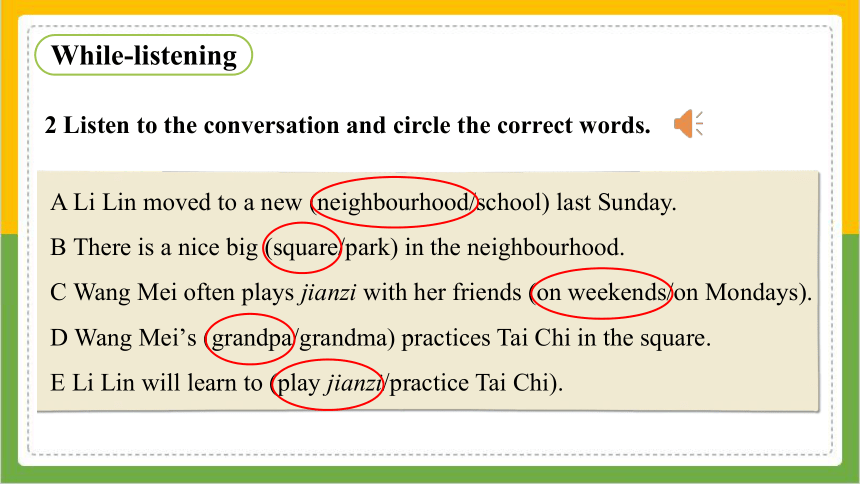
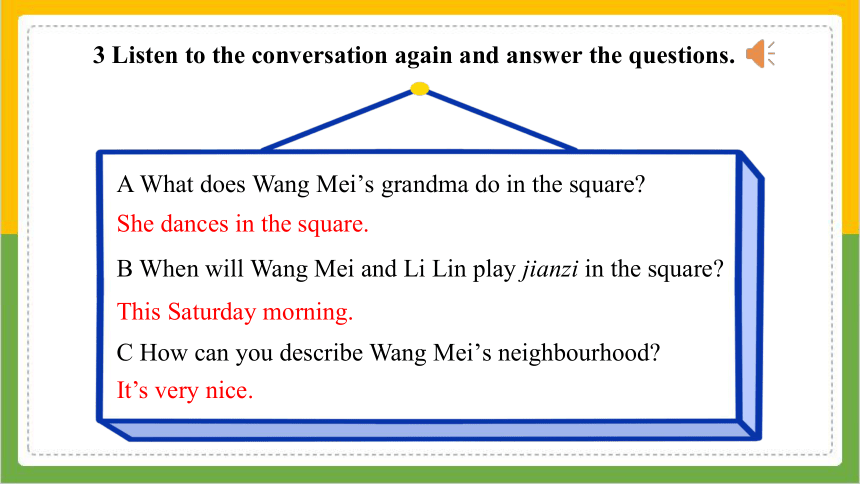
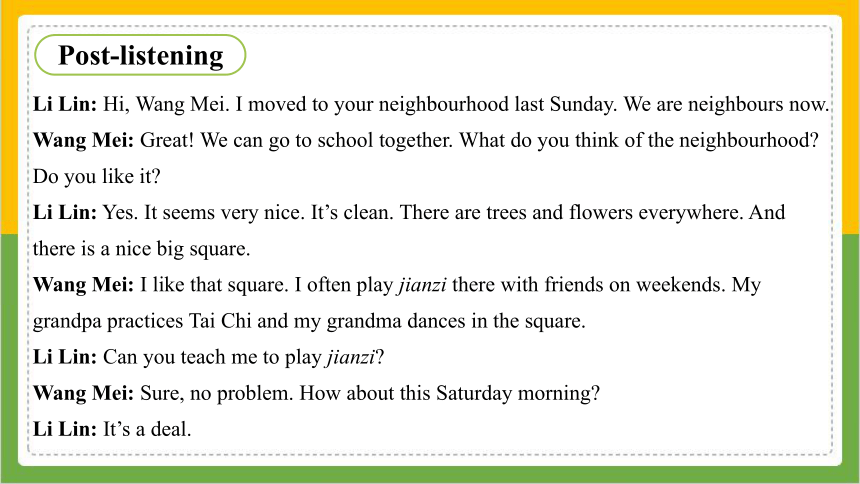
文档简介
(共28张PPT)
Lesson 1 My neighbourhood
Unit 5
Our neighbourhood
To learn some new words, phrases and sentences.
To understand Li Lin and Wang Mei’s neighbourhood through listening.
To talk about your neighbourhood.
To master the pronunciation of ow、ere、ee、ds和eigh.
学习目标
Lead in
neighbourhood n. 街区;城区
neighbour n. 邻居;邻国
seem v. 似乎;看来
everywhere adv. & pron. 处处;到处;所有地方
square n. 广场;四方形;平方‖ adj. 四方形的
deal n. 协议;(尤指)交易;大量
新课讲授
New words
1 What is there in your neighbourhood Tick the places.
a store a bank a square
a restaurant a school a park
a supermarket a gym a movie theatre
Pre-listening
There is a library and a supermarket in my neighbourhood.
My neighbourhood is very nice and clean.
What do you think of your neighbourhood
2 Listen to the conversation and circle the correct words.
A Li Lin moved to a new (neighbourhood/school) last Sunday.
B There is a nice big (square/park) in the neighbourhood.
C Wang Mei often plays jianzi with her friends (on weekends/on Mondays).
D Wang Mei’s (grandpa/grandma) practices Tai Chi in the square.
E Li Lin will learn to (play jianzi/practice Tai Chi).
While-listening
3 Listen to the conversation again and answer the questions.
A What does Wang Mei’s grandma do in the square
B When will Wang Mei and Li Lin play jianzi in the square
C How can you describe Wang Mei’s neighbourhood
She dances in the square.
This Saturday morning.
It’s very nice.
Li Lin: Hi, Wang Mei. I moved to your neighbourhood last Sunday. We are neighbours now.
Wang Mei: Great! We can go to school together. What do you think of the neighbourhood Do you like it
Li Lin: Yes. It seems very nice. It’s clean. There are trees and flowers everywhere. And there is a nice big square.
Wang Mei: I like that square. I often play jianzi there with friends on weekends. My grandpa practices Tai Chi and my grandma dances in the square.
Li Lin: Can you teach me to play jianzi
Wang Mei: Sure, no problem. How about this Saturday morning
Li Lin: It’s a deal.
Post-listening
4 Listen to the dialogue and write true (T) or false (F).
A Jack moved to this new neighbourhood last weekend. ( )
B There is a nice gym in Jack’s neighbourhood. ( )
C They will play basketball this weekend. ( )
T
F
T
5 Work in groups. Describe your neighbourhood.
What do you think of your neighbourhood
It's new/nice/... There is a square/supermarket/... in my neighbourhood.
What do you like to do in your neighbourhood
I like to play sports/talk to my neighbours/...
ow /a / now how_________ ere /e / there everywhere ________
ee /i / tree weekend________ ds /dz/ friends weekends _________
eigh /e / neighbour weigh_________
Listen and repeat. Write more words in each group.
Pronunciation
(1) “move to 表示 搬到……”,后面接表示地点的名词,可以用于描述某人或某物的位置变化。
e.g. He moved to a new city last year. 他去年搬到了一座新城市。
My family moved to this town five years ago.
我的家人五年前搬到了这个小镇。
She moved to a bigger house because of her growing family.
因为家庭人口增多,她搬到了一个更大的房子里。
1. I moved to your neighbourhood last Sunday.
我上周日搬到了你的街区。
Language points
(2) neighbourhood [名词] 街区;城区;邻近的地方
in one’s neighbourhood 在某人的街区
in the neighbourhood 在附近(=near here)
in the neighbourhood of 在……附近
e.g. They are in the same neighbourhood.
他们在同一个街区。
think of 认为;想象
e.g. What do you think of Hebei Province 你觉得河北省怎么样
2. What do you think of the neighbourhood
你觉得这个街区怎么样?
【拓】(1)think of意为“想出”,相当于come up with。
e.g. Who thought of/came up with the idea 谁想出的这个主意
(2)think of还可意为“考虑到”,相当于think about。
e.g. She cares about her family very much but seldom thinks of/about herself.
她非常关心她的家人,却很少考虑到自己。
(3) What do you think of. . . 该句型常用来询问对某人/事物的看法,意为 “你认为······怎么样 ”,其答语常用形容词或表示喜欢/不喜欢的句型。
e.g. —What do you think of the book 你认为这本书怎么样
—Very interesting. 非常有趣。
seem /si m/ v. 似乎;看来
其常见用法如下:
(1) seem (to be)+adj. 好像······
e.g. He seems (to be) very happy about the news. 他好像对这个消息很满意。
3. It seems very nice. It’s clean. 看起来很不错。很干净。
(2) seem (to be)+n. 好像是······
e.g. Linda seems (to be) their monitor. 琳达好像是他们的班长。
(3) seem like+n. 好像······
e.g. It seemed like a good idea at the time. 当时这好像是个不错的主意。
(4) seem to do sth. 好像/似乎做某事
e.g. Life sometimes seems to be full of impossible problems.
生活有时似乎充满了不可能的问题。
(5) It seems +(that)从句 好像······
e.g. It seems (that) he is ill today.
今天他好像生病了 。
everywhere / evriwe (r)/ adv. & pron. 处处;到处
在句中作状语,其前不能使用in、at、to之类的介词。
e.g. Life is full of love everywhere. Let’s enjoy it.
生活处处充满爱。让我们享受它。
The sky is blue, and the flowers are coming out everywhere.
天空是蓝色的,到处都是盛开的花。
4. There are trees and flowers everywhere.
到处都有树和花。
somewhere “在某处;到某处”,多用于肯定句。
anywhere “在任何地方;某个地方”,多用于否定句或疑问句,代替 somewhere。
nowhere “无处;哪里都不”,相当于not... anywhere。
辨析:somewhere、anywhere、nowhere
e.g. They live somewhere or other in France.
他们住在法国的一个什么地方。
Did you go anywhere interesting 你去过什么有趣的地方吗
I can find it nowhere. / I can’t find it anywhere. 我哪儿都找不到它。
5. And there is a nice big square.
还有一个漂亮的大广场。
square
①[可数名词]广场;四方形;平方
e.g. Tian’anmen Square 天安门广场
The square of 7 is 49. 7的平方是49。
②[形容词]四方形的
e.g. a large square room 一个四方形的大房间
6. I often play jianzi there with friends on weekends.
我经常在周末和朋友们在那里踢毽子。
“on weekends 在周末”,为美式英语,相当于on the weekend。在英式英语中常用at weekends/at the weekend。
e.g. We could help them with their study online on weekends.
我们可以在周末在线帮助他们学习 。
【拓】weekend的对应词为weekday“工作日”。
on weekdays/on the weekday意为“在工作日”。
e.g. I take a bus to work on weekdays. 在工作日我乘公共汽车去上班。
no problem
7. Sure, no problem. 当然,没问题。
①没问题;小事一桩
常用于口语中,表示同意或愉快地接受别人的请求。
e.g. —Could you post the letter for me
——你能帮我寄这封信吗?
—No problem.
——没问题。
②不用谢;别客气;没什么
常用来回答感谢,相当于you’re welcome或not at all。
e.g. —Thank you very much. ——非常感谢你。
—No problem. ——别客气。
③没关系;没什么
用来回答道歉。
e.g. ——I’m sorry to keep you waiting so long.
对不起,让你久等了。
——No problem. 没关系。
8. It’s a deal. 说定了。
It’s a deal. 说定了。/一言为定。/就这么办。
常用于口语中。
—Let’s meet at half past six.
——咱们6点半见面吧。
—It’s a deal.
——一言为定。
一、选择划线部分读音不一致的选项
( )A. follow B. below C. hometown D. grow
( )A. teacher B. head C. meet D. see
C
B
当堂检测
二、单项选择
1. —Could you help me carry the equipment, Robin
—________. I’ll do it at once.
A. Good job B. No problem
C. Wait a moment D. That’s right
2. Time seems ________ more quickly when we are having fun.
A. pass B. passes C. to pass D. passed
B
C
Review the pronunciation of the letter combinations ow, ere, ee, ds and eigh.
2. Briefly discuss your community with your classmates in English.
3. Preview the new words and expressions in Lesson 2.
Homework
Lesson 1 My neighbourhood
Unit 5
Our neighbourhood
To learn some new words, phrases and sentences.
To understand Li Lin and Wang Mei’s neighbourhood through listening.
To talk about your neighbourhood.
To master the pronunciation of ow、ere、ee、ds和eigh.
学习目标
Lead in
neighbourhood n. 街区;城区
neighbour n. 邻居;邻国
seem v. 似乎;看来
everywhere adv. & pron. 处处;到处;所有地方
square n. 广场;四方形;平方‖ adj. 四方形的
deal n. 协议;(尤指)交易;大量
新课讲授
New words
1 What is there in your neighbourhood Tick the places.
a store a bank a square
a restaurant a school a park
a supermarket a gym a movie theatre
Pre-listening
There is a library and a supermarket in my neighbourhood.
My neighbourhood is very nice and clean.
What do you think of your neighbourhood
2 Listen to the conversation and circle the correct words.
A Li Lin moved to a new (neighbourhood/school) last Sunday.
B There is a nice big (square/park) in the neighbourhood.
C Wang Mei often plays jianzi with her friends (on weekends/on Mondays).
D Wang Mei’s (grandpa/grandma) practices Tai Chi in the square.
E Li Lin will learn to (play jianzi/practice Tai Chi).
While-listening
3 Listen to the conversation again and answer the questions.
A What does Wang Mei’s grandma do in the square
B When will Wang Mei and Li Lin play jianzi in the square
C How can you describe Wang Mei’s neighbourhood
She dances in the square.
This Saturday morning.
It’s very nice.
Li Lin: Hi, Wang Mei. I moved to your neighbourhood last Sunday. We are neighbours now.
Wang Mei: Great! We can go to school together. What do you think of the neighbourhood Do you like it
Li Lin: Yes. It seems very nice. It’s clean. There are trees and flowers everywhere. And there is a nice big square.
Wang Mei: I like that square. I often play jianzi there with friends on weekends. My grandpa practices Tai Chi and my grandma dances in the square.
Li Lin: Can you teach me to play jianzi
Wang Mei: Sure, no problem. How about this Saturday morning
Li Lin: It’s a deal.
Post-listening
4 Listen to the dialogue and write true (T) or false (F).
A Jack moved to this new neighbourhood last weekend. ( )
B There is a nice gym in Jack’s neighbourhood. ( )
C They will play basketball this weekend. ( )
T
F
T
5 Work in groups. Describe your neighbourhood.
What do you think of your neighbourhood
It's new/nice/... There is a square/supermarket/... in my neighbourhood.
What do you like to do in your neighbourhood
I like to play sports/talk to my neighbours/...
ow /a / now how_________ ere /e / there everywhere ________
ee /i / tree weekend________ ds /dz/ friends weekends _________
eigh /e / neighbour weigh_________
Listen and repeat. Write more words in each group.
Pronunciation
(1) “move to 表示 搬到……”,后面接表示地点的名词,可以用于描述某人或某物的位置变化。
e.g. He moved to a new city last year. 他去年搬到了一座新城市。
My family moved to this town five years ago.
我的家人五年前搬到了这个小镇。
She moved to a bigger house because of her growing family.
因为家庭人口增多,她搬到了一个更大的房子里。
1. I moved to your neighbourhood last Sunday.
我上周日搬到了你的街区。
Language points
(2) neighbourhood [名词] 街区;城区;邻近的地方
in one’s neighbourhood 在某人的街区
in the neighbourhood 在附近(=near here)
in the neighbourhood of 在……附近
e.g. They are in the same neighbourhood.
他们在同一个街区。
think of 认为;想象
e.g. What do you think of Hebei Province 你觉得河北省怎么样
2. What do you think of the neighbourhood
你觉得这个街区怎么样?
【拓】(1)think of意为“想出”,相当于come up with。
e.g. Who thought of/came up with the idea 谁想出的这个主意
(2)think of还可意为“考虑到”,相当于think about。
e.g. She cares about her family very much but seldom thinks of/about herself.
她非常关心她的家人,却很少考虑到自己。
(3) What do you think of. . . 该句型常用来询问对某人/事物的看法,意为 “你认为······怎么样 ”,其答语常用形容词或表示喜欢/不喜欢的句型。
e.g. —What do you think of the book 你认为这本书怎么样
—Very interesting. 非常有趣。
seem /si m/ v. 似乎;看来
其常见用法如下:
(1) seem (to be)+adj. 好像······
e.g. He seems (to be) very happy about the news. 他好像对这个消息很满意。
3. It seems very nice. It’s clean. 看起来很不错。很干净。
(2) seem (to be)+n. 好像是······
e.g. Linda seems (to be) their monitor. 琳达好像是他们的班长。
(3) seem like+n. 好像······
e.g. It seemed like a good idea at the time. 当时这好像是个不错的主意。
(4) seem to do sth. 好像/似乎做某事
e.g. Life sometimes seems to be full of impossible problems.
生活有时似乎充满了不可能的问题。
(5) It seems +(that)从句 好像······
e.g. It seems (that) he is ill today.
今天他好像生病了 。
everywhere / evriwe (r)/ adv. & pron. 处处;到处
在句中作状语,其前不能使用in、at、to之类的介词。
e.g. Life is full of love everywhere. Let’s enjoy it.
生活处处充满爱。让我们享受它。
The sky is blue, and the flowers are coming out everywhere.
天空是蓝色的,到处都是盛开的花。
4. There are trees and flowers everywhere.
到处都有树和花。
somewhere “在某处;到某处”,多用于肯定句。
anywhere “在任何地方;某个地方”,多用于否定句或疑问句,代替 somewhere。
nowhere “无处;哪里都不”,相当于not... anywhere。
辨析:somewhere、anywhere、nowhere
e.g. They live somewhere or other in France.
他们住在法国的一个什么地方。
Did you go anywhere interesting 你去过什么有趣的地方吗
I can find it nowhere. / I can’t find it anywhere. 我哪儿都找不到它。
5. And there is a nice big square.
还有一个漂亮的大广场。
square
①[可数名词]广场;四方形;平方
e.g. Tian’anmen Square 天安门广场
The square of 7 is 49. 7的平方是49。
②[形容词]四方形的
e.g. a large square room 一个四方形的大房间
6. I often play jianzi there with friends on weekends.
我经常在周末和朋友们在那里踢毽子。
“on weekends 在周末”,为美式英语,相当于on the weekend。在英式英语中常用at weekends/at the weekend。
e.g. We could help them with their study online on weekends.
我们可以在周末在线帮助他们学习 。
【拓】weekend的对应词为weekday“工作日”。
on weekdays/on the weekday意为“在工作日”。
e.g. I take a bus to work on weekdays. 在工作日我乘公共汽车去上班。
no problem
7. Sure, no problem. 当然,没问题。
①没问题;小事一桩
常用于口语中,表示同意或愉快地接受别人的请求。
e.g. —Could you post the letter for me
——你能帮我寄这封信吗?
—No problem.
——没问题。
②不用谢;别客气;没什么
常用来回答感谢,相当于you’re welcome或not at all。
e.g. —Thank you very much. ——非常感谢你。
—No problem. ——别客气。
③没关系;没什么
用来回答道歉。
e.g. ——I’m sorry to keep you waiting so long.
对不起,让你久等了。
——No problem. 没关系。
8. It’s a deal. 说定了。
It’s a deal. 说定了。/一言为定。/就这么办。
常用于口语中。
—Let’s meet at half past six.
——咱们6点半见面吧。
—It’s a deal.
——一言为定。
一、选择划线部分读音不一致的选项
( )A. follow B. below C. hometown D. grow
( )A. teacher B. head C. meet D. see
C
B
当堂检测
二、单项选择
1. —Could you help me carry the equipment, Robin
—________. I’ll do it at once.
A. Good job B. No problem
C. Wait a moment D. That’s right
2. Time seems ________ more quickly when we are having fun.
A. pass B. passes C. to pass D. passed
B
C
Review the pronunciation of the letter combinations ow, ere, ee, ds and eigh.
2. Briefly discuss your community with your classmates in English.
3. Preview the new words and expressions in Lesson 2.
Homework
同课章节目录
